Beck and Devendra Banhart find their footing among old friends and fans at the Santa Barbara Bowl
Kevin Bronson on
1
By Gabriel Jones
It’s been a few years since Beck has toured or put out a new album. He’s grown, raised a couple of kids; we’ve grown and perhaps moved on to other artists. And at Thursday’s show at the Santa Barbara Bowl he and his audience seemed like long-lost lovers who’ve found each other again and are trying to remember how this all goes.
The set opened haltingly with “Loser,” Beck rushing through the words over his band’s pure, swaggering Louisiana sludge, a striking counterpoint between his own apparent uncertainty and the band’s exuberance that lasted throughout much of the first half of the set. Smokey Hormel’s guitar was even more raw and dirty than the original recording, and bassist Justin Meldal-Johnsen strutted around the stage sporting a glorious ’fro and a joyous smile. “Smokestack” (as Beck referred to Hormel), Johnsen, keyboardist Roger Manning, and drummer Joey Waronker, all prominent session musicians who played on Beck’s “Mutations,” “Sea Change” and “Midnite Vultures” and toured together for “Sea Change,” were clearly overjoyed at being able to share the stage – Johnsen at one point thanking Beck for “bring us all together again.”
- ||| Photos by Laurie Scavo
Beck, however, took a little longer to shake off the dust. For much of the evening his singing was sharp and jagged, lacking the full deep roundness it normally has in rising or falling warmly and assuredly from note to note and instead hitting them directly head-on, as if perhaps he were thinking a little too much about making sure he hits the right one. Even a half-dozen songs in, his voice was still unusually adenoidal, sharper and thinner than in the past, suggesting that what the audience was watching was less a full return to the stage than a rehearsal to see what still works, an exploration for what can get us all back in the groove, him included. He acknowledged it’s still a work in progress, noting that the band hadn’t played together live in about a decade, excepting a show at the El Rey earlier in the week, and that they’d only come together the previous Tuesday to figure out what songs to play – “so you are witnessing the shedding of the cobwebs, so to speak.”
After an artist has been around for a decade or two, what he chooses for a setlist – particularly for a retrospective crowd-pleaser rather than a showcase for new material – offers some insight into his thoughts about what’s led them to where they are now and where they want to go from here. Aside from the obligatory “Loser” and two or three each from his last three albums, Beck drew his 21-song setlist entirely from 1996’s “Odelay” and 2002’s “Sea Change,” the respective peaks of the two sides of his musical personality: the magpie-jester who pulls together a wide range of styles and influences into a wry, ironic, playful funk-jam, and the maturing singer-songwriter working with a widening emotional palette of loss and despair and change that adulthood brings.
The audience itself seemed a little uncertain at times about how to reconcile the two, dancing in fits and starts, holding up a few lighters here and there, but looking not always sure where things were going or whether the feeling would last – partly perhaps because a number of them knew Beck only from his Top 40 hits, wondering if all this “Sea Change” stuff was new material and if the jester had gone domestic.
The first genuine highlight came seven songs in with Sea Change’s “Sunday Sun” – Smokey with violin bow, Manning’s piano delicate and brittle and painfully moving like dancing on broken glass, building to an epic jam as if the song, as well as Beck and his band, were rising from the fragments. This offered Beck the confidence for a partial return of his swagger with the next song, “Odelay’s” trip-funk “Hotwax” – Beck telling the audience “I want to dedicate this guitar solo to every guitar solo played in this venue in the 1980s,” and when his solo inevitably fell apart, “I got caught up in the guitar solo and couldn’t get out.”
Other earlier highlights included “Paper Tiger,” “Solder Jane” from 2006’s “The Information” and “Guess I’m Doin’ Fine,” by which time Beck had found his voice and knew it, letting it soar and float over the bowl with a rich, deep, full lament. Then the “Sea Change” material in the setlist gradually gave way to “Odelay” and to his more playful songs, reminding the audience that the precocious kid is still in there. In the second half of the show the band played with supreme confidence through a loud, brash, speed-punk “Minus” as well as “Devil’s Haircut,” although Beck left it to Johnsen to joyously, maniacally shout the song to a close.
By “Where It’s At,” Beck the performer finally found his own swagger again, seemingly by sheer force of will. Throughout most of the show he merely stood at the microphone with his guitar like a traditional singer-songwriter, but as he broke it down for the song’s call-and-response with the audience, he slid across the stage, recalling Thom Yorke’s performance in the video for “Lotus Flower,” a body slowly finding its limbs again, like crawling out of a cocoon and finding joy in pure movement.
Perhaps the best symbol of where Beck is at – no pun intended – was the sight of his 8-year-old son Cosimo dancing wildly on stage to his dad’s music (go Google it, it’s pretty adorable), suggesting that for Beck, the kid’s still there somewhere alongside the more “serious’ musician, dancing, joyous, but just sharing a different part of the stage. And by the end of the show, with an encore of a hilariously sped-up “Girl” (rushing to beat the Bowl’s time curfew, like a kid playfully flirting with breaking the rules) and a spectacularly huge, fat, and raucous “E-Pro,” the audience was indeed in love again, dancing and singing as one, like old lovers remembering not to think too much and to let their bodies take over.
Opening the show was Devendra Banhart, unusually genial and restrained in a stripped-down three-piece set-up that, in spite of its downtempo intimacy, built toward an understated but quiet intensity over its dozen songs.
Banhart, seated with his guitar for most of his set, came off as modest but confident, a man doing his own thing and finding deep satisfaction in it, and while it’s perhaps not yet enough to fill the Bowl, it did a lot for the ones who’d shown up for him (a few women behind me sounded like they were about to faint throughout most of his set). His performance and songs, sung in both English and Spanish, suggested a man who’s come to peace with his ghosts and talks to them comfortably, who’s come to terms with loss and burial and redemption, and his set alternated between stark, spare, hauntingly delicate melodies of guitar and piano – sounding a little like where Coldplay might have gone if it hadn’t chosen darkness and sterile arena rock – and more rollicking, jaunty numbers that resembled Lou Reed or Neil Young on one of their happier days.
Much of Banhart’s performance felt as if he were just playing with a couple of friends around a campfire to a few people he cares about – a remarkable feat in the largely unfilled Bowl – although toward the end he started bouncing around in his chair a little before finally standing up to belt out the closer that, even with just three instruments, gradually rose to a full near-orchestral swell. Those few seconds of huge, bowl-ready emotion that suggested what Banhart could do if he made it his mission. Just as quickly, though, he humbly thanked the audience, asking them if they realized how huge it was that Beck was about to take the stage, and departed.

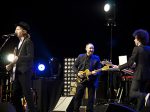
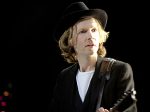
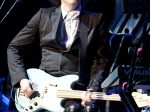
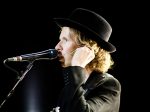
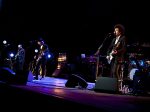
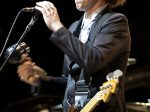
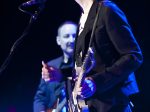
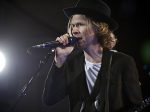
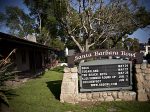
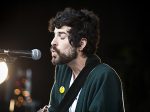
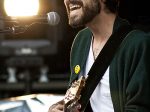

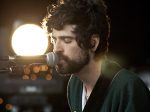
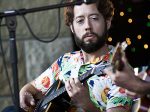
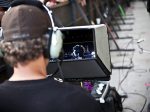
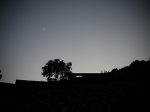




Excellent photos!!